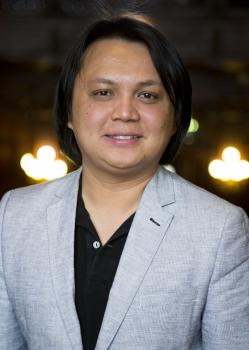Dr. Macalalag Awarded $2 Million NSF Grant for Collaborative Research on STEM Teaching

Associate Professor of Education Dr. Augusto Macalalag will explore how Science, Technology, Engineering, and Mathematics (STEM) interdisciplinary learning impacts 7th- through 12th-grade student understanding through an educator professional development program. This collaborative research is funded through a National Science Foundation (NSF) grant with a total intended award amount of $2.8 million, of which $2,031,108 is awarded to Arcadia.
The program is meant to help teachers prioritize critical thinking and real-world applications to STEM over procedural knowledge. “Collaborative Research: Understanding STEM Teaching through Integrated Contexts in Everyday Life” provides a series of professional development programs for STEM educators at the middle school and high school levels to encourage connections between curriculum topics.
“What if we get students involved in a debatable issue, like if speed limits be reduced in Philadelphia,” said Dr. Macalalag. “Instead of having them calculate the velocity or speed, which students think is boring, let’s engage them in something where they have context, such as the basis of speed limits in areas of Philadelphia, where accidents predominantly happen and why, the cultural practices with regards to driving and speeding, and who decides the speed limits. There is a context of why STEM is being learned and taught beyond learning science and mathematics.”
Through this type of curriculum, Dr. Macalalag said students feel empowered to “use their scientific expertise to be agents of change” in their local communities by tackling issues like lead paint contamination, poor water or air quality, or the existence of “food deserts.” In Philadelphia, Dr. Macalalag imagines a curriculum built around the sugary drinks tax, where students could learn about the chemical makeup of sugar in one course, the health implications of too much sugar in another, and the political-social issue of a sugary drinks tax.
The professional development program will teach STEM educators how to create interdisciplinary curriculum, as well as how to address changes at the administrative level. Dr. Macalalag said the project emphasizes developing support structures for teachers so they have the flexibility to make STEM interdisciplinary.
The first professional development cohort of educators from the School District of Philadelphia, Cheltenham School District, and Philadelphia’s American Paradigm Schools, Simon Gratz High School Mastery Charter Schools, and Mariana Bracetti Academy Charter School will begin a weekly series of in-person and online workshops.
Arcadia University is leading the grant and Principal Investigator Dr. Macalalag will collaborate with colleagues at La Salle University, Villanova University, and Saint Joseph’s University in Philadelphia and Mercyhurst University in Erie, Pa. in the implementation of this research project.
Dr. Macalalag credits his work on the Philadelphia Regional Noyce Partnership Scholarship Program and Arcadia University Awarded USAID Sub-Contract for STEM Educator Curriculum Development in Egypt Activity (STESSA) as the catalysts for this NSF grant. The NSF Robert Noyce Teacher Scholarship Program enabled him to build the connections with the other institutions for this proposal. Additionally, the United States Agency for International Development (USAID) subcontract through 21st Century Partnership for STEM Education (21PSTEM) for the STESSA project provided the first steps in building this educator curriculum and professional development.
“I’m lucky because a lot of my research projects now are being funded in a similar vein: It’s about making STEM education more relevant to students and teachers,” said Dr. Macalalag. “In middle and high school, subjects are departmentalized and siloed, and rarely do you see an interdisciplinary approach. So, that’s why we’re starting with middle and high school teachers.”

